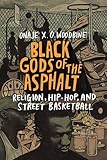Black gods of the asphalt : religion, hip-hop, and street basketball / Onaje X.O. Woodbine.
Material type: TextPublisher: New York : Columbia University Press, [2016]Copyright date: ©2016Description: 1 online resource : illustrationsContent type:
TextPublisher: New York : Columbia University Press, [2016]Copyright date: ©2016Description: 1 online resource : illustrationsContent type: - 9780231541121
- 0231541120
- Streetball -- Social aspects
- Basketball -- Social aspects -- United States
- African American basketball players -- Social conditions
- African American young men -- Social conditions
- Urban youth -- Social conditions
- Hip-hop -- United States
- Basket-ball -- Aspect social -- États-Unis
- Joueurs de basket-ball noirs américains -- Conditions sociales
- Jeunes hommes noirs américains -- Conditions sociales
- Jeunes en milieu urbain -- Conditions sociales
- Hip-hop -- États-Unis
- Basket-ball de rue -- Aspect social
- GAMES -- Gambling -- Sports
- SPORTS & RECREATION -- Business Aspects
- SPORTS & RECREATION -- Essays
- SPORTS & RECREATION -- History
- SPORTS & RECREATION -- Reference
- TRAVEL -- Special Interest -- Sports
- African American young men -- Social conditions
- Basketball -- Social aspects
- Hip-hop
- Urban youth -- Social conditions
- United States
- Jugend
- Streetball
- Basketball
- Hip-Hop
- USA
- 796.3238 23
- GV887.3 .W66 2016eb
- online - EBSCO
| Item type | Current library | Call number | URL | Status | Notes | Barcode | |
|---|---|---|---|---|---|---|---|
 eBook
eBook
|
Biblioteca "Angelicum" Pont. Univ. S.Tommaso d'Aquino Nuvola online | online - EBSCO (Browse shelf(Opens below)) | Online access | Not for loan (Accesso limitato) | Accesso per gli utenti autorizzati / Access for authorized users | (ebsco)1232724 |
Print version record.
Includes bibliographical references and index.
Part I: Memory -- "Last ones left" in the game: from Black resistance to urban exile -- Boston's memorial games -- Part II: Hope -- Jason, hoops, and grandma's hands -- C.J., hoops, and the quest for a second life -- Part III: Healing -- Ancestor work in street basketball -- The dunk and the signifying monkey.
J-Rod moves like a small battle tank on the court, his face mean, staring down his opponents. "I play just like my father," he says. "Before my father died, he was a problem on the court. I'm a problem." Playing basketball for him fuses past and present, conjuring his father's memory into a force that opponents can feel in every bone-breaking drive to the basket. On the street every ballplayer has a story. Onaje X.O. Woodbine, a former streetball player who became an All-Star Ivy Leaguer, brings the sights and sounds, hopes and dreams of street basketball to life. Big games have a trickster figure and a master of black talk whose commentary interprets the game for audiences. The beats of hip-hop and reggae make up the soundtrack, and the ball players are half-men, half-heroes, defying the ghetto's limitations with their flights to the basket. Streetball is rhythm and flow, and during its peak moments, the three rings of the asphalt collapse into a singular band, every head and toe pressed against the sidelines, caught up in the spectacle. Basketball is popular among young black American men, but not because, as many claim, they are "pushed by poverty" or "pulled" by white institutions to play it. Black men choose to participate in basketball because of the transcendent experience of the game. Through interviews with and observations of urban basketball players, Onaje X.O. Woodbine composes a rare portrait of a passionate, committed, and resilient group of athletes who use the court to mine what urban life cannot corrupt. If people turn to religion to reimagine their place in the world, then black streetball players are indeed the adepts of the asphalt.
In English.


